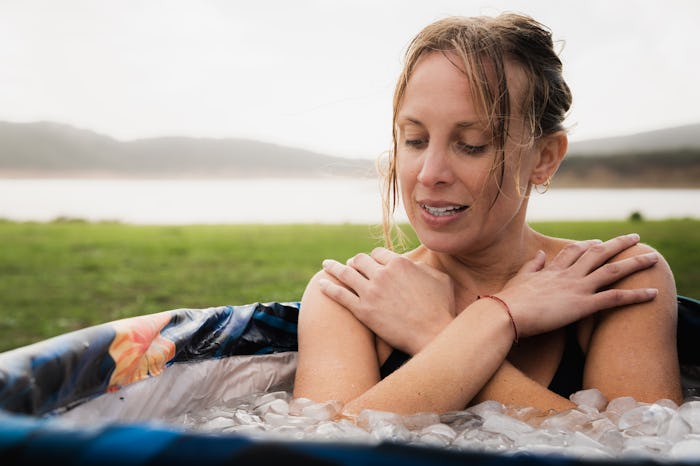Brrrrr

Can You Cold Plunge While Pregnant?
You know hot tubs are out, but does that mean all extreme water temps are out?
Cold plunging is yet another wellness trend you probably have a strong opinion on — either you love your three-minute frigid dunks, or you can’t fathom why any sane person would put themselves in an ice bath every day. Whether it’s part of your routine already, or you’re newly pregnant and think it might help ease some inflammation, you might be wondering: can you cold plunge while pregnant? Expecting parents are generally discouraged from lounging in hot tubs or taking hot baths, because raising your core body temperature can increase the risk of neural tube defects for your baby, as Romper previously reported.
So, is it just heat you should be worried about, or does throwing your body temp too far off in either direction have its risks?
What is cold plunging, and what are its benefits?
Cold plunging involves sitting in a bathtub of cold water and ice, or swimming in a cold place outdoors, for a few minutes at a time. Beginners might start with 30 seconds, while veterans might soak for up to 10 minutes. The water should be 50 degrees Fahrenheit or lower, according to an article by a Mayo Clinic sports medicine physician, to see potential benefits: reduced inflammation and soreness, a beefed up immune system, and even changes in hormone production.
A little scrolling through Instagram and Tik Tok will introduce you to plenty of people who swear by cold plunging and its benefits. Some researchers have hypothesized that routine cold plunges do help a person get used to the feeling of extreme stress, which could be helpful when giving birth. But there are no studies or data available about whether the benefits of cold plunges are real or measurable, experts say. This means there’s also no information about the potential risks of cold plunging for a pregnant person.
Can you cold plunge while pregnant?
You should ask your own OB-GYN or midwife about whether cold plunging is safe for you during pregnancy, but you may not get the concrete, yes-or-no answers you’re hoping for.
“There has not been a lot of research, of course, on the safety of doing this in pregnancy. When we talk about water temperature exposure and pregnancy, everyone tends to focus on the other end of things and staying away from hot water,” says April Barbara, APRN, certified nurse-midwife at Orlando Health Physician Associates.
As for cold plunges and the potential risks of dropping your body temperature, Barbara says we simply don’t know enough about how it would affect someone who is pregnant or their fetus. “There is limited data on the effect of environmental cold stress on pregnancy outcomes. Everything is limited. We don’t do [studies] in pregnancy because that’s just not ethical, so we really don't have a lot to say on it,” Barbara explains.
Because there isn’t much information available about the risks of cold plunges for pregnant people, your OB or midwife might just tell you to avoid it altogether. There may not be proof it’s risky, but your doctor may have reasonable concerns.
“Cold plunges expose you to temperatures below 60 degrees Fahrenheit, and while they sound interesting, are not recommended in pregnancy for several reasons. First of all, there is not enough research on this topic to prove any benefit. Even in the non-pregnant person, cold plunges expose the body to temperatures which can cause hypothermia, cardiovascular damage and even drowning,” says Dr. Jill Rabin, M.D., OB-GYN at Northwell Health and professor of obstetrics and gynecology at the Donald and Barbara Zucker School of Medicine at Hofstra/Northwell.
Pregnant or not, when your body is exposed to chilly temperatures, your blood vessels narrow and tighten (which is called vasoconstriction). If you’re pregnant, vasoconstriction “can reduce blood flow to your baby through your uterus and placenta, causing the baby to receive less oxygen and nutritional support,” Rabin says.
Lastly, any scenario that could involve water on the ground or slipping and sliding with wet feet is worth avoiding, Rabin points out. “Slippery surfaces are dangerous for anyone, but especially in pregnancy when the growing uterus may affect your balance,” she says.
While she says there’s no glaringly obvious reason cold plunging while pregnant would be unsafe, Barbara says, you wouldn’t catch her cold plunging while pregnant, “because why upset the apple cart?”
“Your body does naturally what it should be doing for pregnancy. Do I think any of this is necessary? No. But if people are having issues with inflammation and this helps, then I can see why they would want to do it,” she says.
So, what’s the final verdict from experts on whether you can cold plunge while pregnant? Your provider will probably say there’s not much hard data available about the risks or the benefits. If you want your risk level to be zero, best to wait until after your baby is born before cold plunging.
Experts:
Dr. Jill Rabin, M.D., OB-GYN at Northwell Health and professor of obstetrics and gynecology at the Donald and Barbara Zucker School of Medicine at Hofstra/Northwell
April Barbara, APRN, certified nurse-midwife at Orlando Health Physician Associates